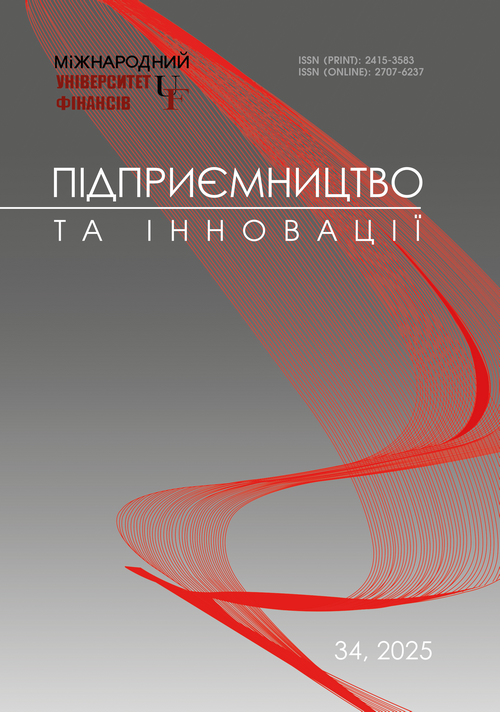APPLICATION OF THE PRINCIPLES OF HOLISM IN ENTERPRISE MANAGEMENT WITH A CRITICALLY HIGH LEVEL OF UNCERTAINTY
Abstract
The emergence and spread of holism as a concept was initiated in the deep past from the position of explaining the need for holistic knowledge of the surrounding world. The first practical application of holism was in medicine through the use of a complex of procedures aimed at physical and spiritual recovery. Today's current problems regarding the impossibility of providing the necessary level of information basis for making every management decision prompt the study of objective and subjective circumstances of the occurrence of uncertainty with the subsequent justification of the expediency of turning to the principles of holism. The purpose of the article is to clarify the meaning of the term "uncertainty" in order to substantiate the feasibility of considering the possibility of applying the principles of holism in enterprise management. To form the theoretical foundations of the application of holism in enterprise management, the following methods were used: induction and deduction, comparison and systematization – in the study of the essential characteristics of the terms "uncertainty" and "holism"; synthesis and analysis – a critical examination of initial concepts and modern approaches to the interpretation of the concept of "uncertainty"; morphological analysis – to substantiate the expediency of applying the principles of holism in enterprise management in order to improve the information support of the management decision-making process; graphic – for visual representation of theoretical and methodical material; abstract-logical – for theoretical generalizations and research conclusions. Through the study of initial concepts and critical consideration of modern approaches (total and complex predicted influence of a large number of factors; identification and search for differences in relation to risk; consideration as the opposite of informed; psychological features of a person to perceive changes in personal space) proved that uncertainties are a circumstance that always exists. The current conditions of doing business in Ukraine, which are burdened by military actions, are characterized by high dynamism, which actually nullifies all possible measures to improve the information support of enterprise management. It is substantiated that the advantages of holism provide an opportunity to improve information provision due to a holistic vision of the main trends that determine the state and dynamics of the enterprise's operating environment with subsequent scaling in relation to a certain process for making appropriate management decisions.
References
Вісема Х. Менеджмент у підрозділах фірми: підприємництво та координація у децентралізованій компанії / пер. з англ. Київ : Основа, 1996. 287 с.
Котлер Ф., Келлер К., Павленко А. Маркетинговий менеджмент. Київ : Видавництво «Хімджест», 2008. 720 с
Кредитний ризик комерційного банку / за ред. В.В. Вітлінського. Київ : Знання, 2000. 251 с.
Макарюк О.В. Оптимізація господарської діяльності як основа для забезпечення стабільного розвитку за умов невизначеності. Вісник Сумського державного університету. 2007. №1. С. 85–93.
Funtowicz S., Ravetz J. Uncertainty and quality in science for public policy. Kluwer, Dordrecht, 1990. 755 p.
Greenspan A. Activism. International Finance. 2011. 18 p.
Keynes J.M. The general theory of employment, interest and money. 1936. P. 190. URL : https://www.files.ethz.ch/isn/125515/1366_keynestheoryofemployment.pdf (дата звернення 16.12.2024).
Knight F. Risk, uncertainty, and profit. Princeton, NJ : Princeton University Press. 2002. 233 р.
Visema Kh. (1996) Menedzhment u pidrozdilakh firmy: pidpryiemnytstvo ta koordynatsiia u detsentralizovanii kompanii [Management in the divisions of a firm: entrepreneurship and coordination in a decentralized company]. Kyiv: Osnova. (in Ukrainian)
Kotler F., Keller K., Pavlenko A. (2008) Marketynhovyi menedzhment [Marketing Management]. Kyiv: Vydavnytstvo «Khimdzhest». (in Ukrainian)
Vitlinskyi V. V. (ed.) (2000) Kredytnyi ryzyk komertsiinoho banku [Credit risk of a commercial bank]. Kyiv: Znannia. (in Ukrainian)
Makariuk O. V. (2007) Optymizatsiia hospodarskoi diialnosti yak osnova dlia zabezpechennia stabilnoho rozvytku za umov nevyznachenosti [Optimization of economic activity as a basis for ensuring sustainable development under conditions of uncertainty]. Visnyk Sumskoho derzhavnoho universytetu – Bulletin of Sumy State University, no. 1, pp. 85–93.
Funtowicz S., Ravetz J. (1990) Uncertainty and quality in science for public policy. Kluwer, Dordrecht.
Greenspan A. (2011) Activism. International Finance.
Keynes J. M. (1936) The general theory of employment, interest and money. Available at: https://www.files.ethz.ch/isn/125515/1366_keynestheoryofemployment.pdf (accessed December 16, 2024).
Knight F. (2002) Risk, uncertainty, and profit. Princeton, NJ: Princeton University Press.



